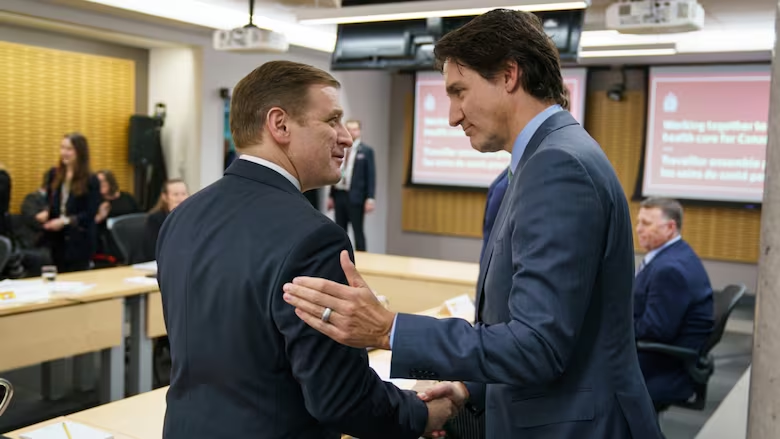Have-not once again: N.L. to receive $218M equalization payment next fiscal year
Province once celebrated end of equalization, but critics have panned formula for years

For the first time since 2008, Newfoundland and Labrador will receive money from the federal government under the equalization program.
The province will take in $218 million from Ottawa in the 2024-25 fiscal year, according to a letter sent from federal Finance Minister Chrystia Freeland to Newfoundland and Labrador Finance Minister Siobhan Coady last week.
Equalization is the federal government's transfer program for addressing "fiscal disparities among provinces" to provide reasonably comparable levels of public services.
Newfoundland and Labrador famously celebrated the end of equalization payments in 2008 when oil royalties were flowing and unemployment was low.
"This is a very proud day for Newfoundlanders and Labradorians, I can tell you," former premier Danny Williams told media and supporters on Nov. 3, 2008. "Effectively this year Newfoundland and Labrador is now a have province. That's a momentous day for the people of this province."
Williams echoed sentiments from another former premier, Brian Peckford, who made a prediction in his victory speech nearly 30 years earlier.
"One day the sun will shine and have-not will be no more," Peckford said in 1982.
On Monday, Coady was asked if any pride was lost to be back on equalization again. It's something the provincial government believes should have happened years ago.
"I don't think anything is lost. This is about ensuring Newfoundlanders and Labradorians are treated like the rest of Canadians, that we have the equivalent level of service for the equivalent taxation value," she said. "In fact, if they had listened to us, we'd be receiving more in equalization."
Coady said the reversal is based on three small changes to the equalization formula: one regarding property taxation, another on hydroelectricity and the third on how population is calculated.
The formula is now locked in until 2029, Coady said, so other changes the province wants to see will not take effect until after that date.
From have-not, to have, to have-not again
The province's already fragile economy was dealt a massive blow in 1992 when the federal government announced a moratorium on the cod fishing industry that put 30,000 people out of work. In the years following, 10 per cent of the population moved away and the labour force shrank drastically.
This history underpinned William's triumphant announcement in 2008.
"Over the years we have been ridiculed for that," he said. "At times we've been presented as the poor cousins in Canada. Now we can hold our heads high and feel very good about it."

The province's financial fortunes have changed since 2008. Newfoundland and Labrador has a debt of $16 billion — about $30,000 per person in the province.
While Williams will be remembered for leading the province out of equalization payments, he'll also be remembered for the Muskrat Falls megaproject and its contribution to the province's financial struggles. Described as a "boondoggle" by Stan Marshall, the CEO who led the project, the cost of the hydroelectric dam has ballooned to $13.4 billion for a province of 521,000 people.

While other federal transfers, such as the Canada Health Transfer, are tied to population, equalization is determined by a formula.
Critics of the equalization formula have spent years arguing Newfoundland and Labrador should qualify for payments, often taking issue with the inclusion of the province's offshore oil royalties in the equation and the cost of delivering services to an area three times larger than the Maritime provinces combined.
Former Progressive Conservative leader Ches Crosbie campaigned on a promise to hold a referendum on equalization if elected in 2019. He believed that would have forced Ottawa to renegotiate the formula.
In the absence of equalization money, the province has struck deals with the federal government over the years to score additional funding on specific issues. In 2021, for example, Premier Andrew Furey and Prime Minister Justin Trudeau negotiated a $5.2-billion deal to stabilize electricity costs associated with the commissioning of Muskrat Falls.
Equalization will make up about 20 per cent of total federal transfers to the province. Newfoundland and Labrador will receive a total of $1.1 billion, the bulk of which comes from $688 million in health transfers.
Newfoundland and Labrador joins Prince Edward Island, Nova Scotia, New Brunswick, Quebec, Ontario and Manitoba on the list of provinces receiving equalization payments in 2024-25. Quebec will receive the most, at $13.3 billion, while Newfoundland and Labrador will receive the smallest payment.
Coady compared Newfoundland and Labrador's amount to that of Nova Scotia — where the federal government will transfer more than $3 billion in equalization payments next year.
"I think there's a problem with the formula," Coady said.
Download our free CBC News app to sign up for push alerts for CBC Newfoundland and Labrador. Click here to visit our landing page.


